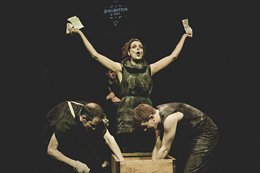The labyrinthine world of fantasy writing is relatively under-represented in Irish theatre and Tribe Theatre have stepped up to the ivy-clad and cobwebbed plate to put matters right on that score. It could have been the cue for a lot of dry ice and the sound of rumbling storm clouds but in this new production, a strange netherworld is brought creepily to life through the strength of athletic and enterprising performances in a work that is astutely adapted and directed.
Jeff Vandermeer is a highly successful fantasy writer, and Bob Kelly – a Sligo actor who has had his own brushes with success, not least a nomination for best supporting actor in the Irish Times Theatre Awards for his role in Blue Raincoat’s production of The Poor Mouth – approached him about adapting his work for this production. VanderMeer gave the work his blessing and Kelly set to it.
 It is interesting that the actor has worked with Blue Raincoat as there is something of the Theatre of the Absurd about this. And yet fantasy is a different class of a beast. Where the absurd often catches a sense of pointlessness in the way human affairs are organised, fantasy often looks to an infinity of worlds with their own particular point and internal logic.
It is interesting that the actor has worked with Blue Raincoat as there is something of the Theatre of the Absurd about this. And yet fantasy is a different class of a beast. Where the absurd often catches a sense of pointlessness in the way human affairs are organised, fantasy often looks to an infinity of worlds with their own particular point and internal logic.
To invite us into this work the audience is greeted by an utterly unreliable narrator, Hilary Bowen-Walsh, who charmingly promises us that the story will consist of four parts, all relating to the life of the freshwater squid. So far, so fascinating, but alas the play has only the most sporadic references to the bould squid. Before long we descend into an underworld of whores and hucksters.
Put together on a shoestring budget it is a production that relies on the proverbial smoke and mirrors to make it happen. Rob Moloney’s low-amp lighting and a more or less constant soundscape of recorded cello music, distant chanting and general discord combine to let our imaginations create the dark space for ourselves.
Kelly is a graduate of L'École Internationale de Théâtre Jacques Lecoq in Paris, and the actors in this piece – in particular the ever-active chorus of Eadaoin O’Donoghue, Cedric Merillon and Ronan Dempsey – perform with a stylised and highly physical form of acting where they create the atmosphere of the place as much as they create characters. Cederic Merillion's engaging performance is particularly strong in evoking the atmosphere of the degenerate underworld, having both the quality of a malevolent fairy and a street-wise thug.
 Gerard Adlum plays the title role of Dradin, a wandering priestly figure and forlorn would-be lover who finds himself at the mercy of a swirling city of creepy degenerates where ne’er a squid is safe. The Dradin role is one that could easily bog down a production. No more than we are drawn to the romantic prince in the panto, it is a role which could easily have sap written all over it. But Gerard Adlum makes a surprisingly good job of it and manages to beguile the audience with a sense of having diverted on his spiritual retreat to find his true love. Of course it might well be a disastrous mistake to conduct his search at the gates of some place that might just be hell.
Gerard Adlum plays the title role of Dradin, a wandering priestly figure and forlorn would-be lover who finds himself at the mercy of a swirling city of creepy degenerates where ne’er a squid is safe. The Dradin role is one that could easily bog down a production. No more than we are drawn to the romantic prince in the panto, it is a role which could easily have sap written all over it. But Gerard Adlum makes a surprisingly good job of it and manages to beguile the audience with a sense of having diverted on his spiritual retreat to find his true love. Of course it might well be a disastrous mistake to conduct his search at the gates of some place that might just be hell.
Getting back to the opening, it is understandable that Kelly wanted to draw us into this strange world with an opening sequence that was full of bounce and light-hearted humour. That’s fine in its own right but one difficulty that it created was that most of the piece did not operate at this kind of level. The humour is much murkier and cerebral and less laugh-out-loud. The opening sequence may have created an expectation of light-heartedness that was never going to be followed through with the body of the work and perhaps the audience could have been trusted to find their way into it with less of that kind of flash and dazzle. However, that was by no means a fatal flaw in an imaginatively realised piece of work.
It is the kind of work that may well bring a new audience of non-fantasy readers to the twistedly quirky and verbally unpredictable world of Jeff VanderMeer, where there is, on the evidence of Dradin, In Love, a sense something potentially beautiful about to break through the bedlam. And while there is plenty of chorus work and narrative voice in the play it is never less than engaging at a visual level.
This was a production put together without Arts Council or Fundit funding and relied primarily on ticket sales. And how can one resist pointing out that it cost twelve squid to get in.
Liam Heylin’s plays include Gdirl from Gdansk and Love, Peace & Robbery. He works as a journalist for the Irish Examiner.